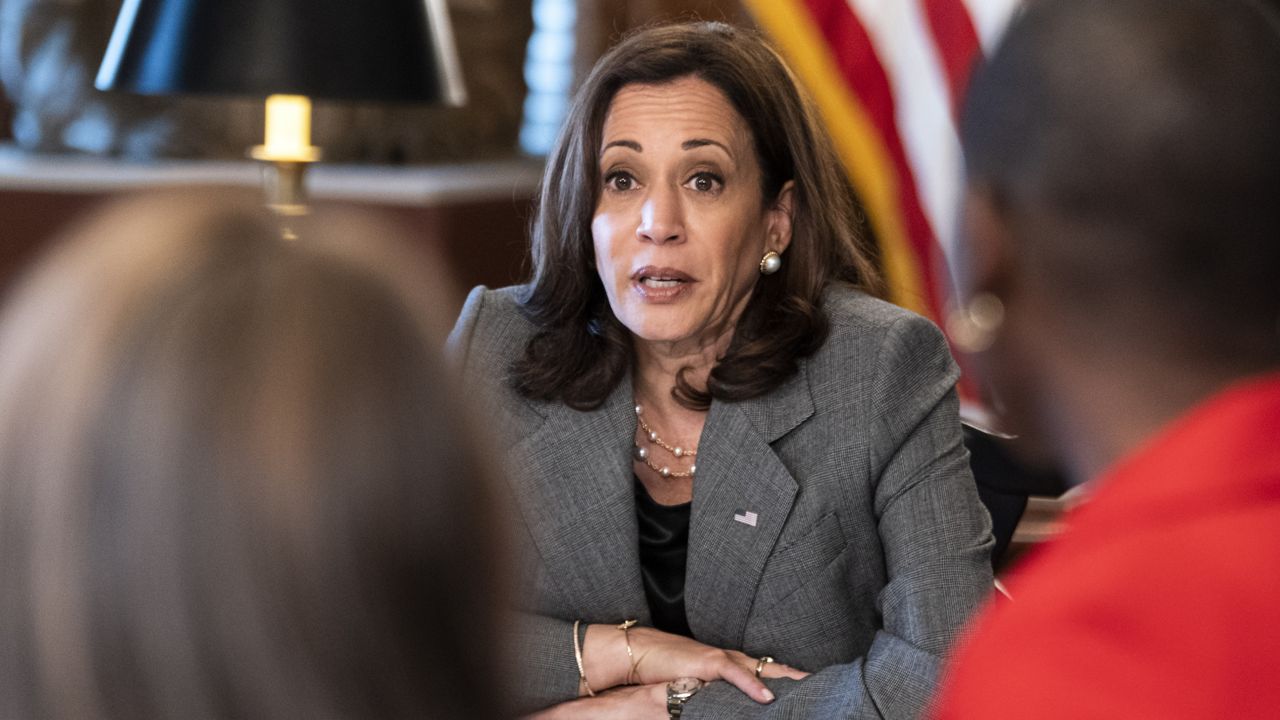Vice President Kamala Harris offered a fiery defense of abortion access during a roundtable event on Tuesday, where she met with constitutional law, privacy and technology experts to highlight the “real-world implications” should the Supreme Court overturn Roe v. Wade, according to the White House.
“I think we all believe and know that our nation was founded on certain principles that we hold dear. Principles of freedom, liberty, and self determination,” she said to those assembled at the Vice President's Ceremonial Office in the Eisenhower Executive Office Building. “And I do believe that all of those principles are at stake when we look at the leaked draft opinion about what this decision may end up being.”
The vice president’s remarks come as the Supreme Court appears poised to overturn the landmark 1973 Roe v. Wade case that federally protected a woman’s right to an abortion. A leaked draft opinion outlining the decision was published by POLITICO in early May, and a decision in the case is expected by the end of June.
A ruling could come as soon as Wednesday, the next publicly scheduled day the high court issues opinions, but the Supreme Court could also opt to schedule more opinion days later in June or July, which is typically when the court goes into summer recess. Historically, the more divisive or controversial decisions have been saved for the end of a Supreme Court session.
And while the draft opinion was just that – a draft, not a final outcome – many are bracing for the possibility that the nation’s highest court will follow through in overturning the landmark decision. Chief Justice John Roberts at the time confirmed the authenticity of POLITICO’s report, although said it did “not represent a decision by the Court of the final position of any member on the issues in the case.”
The Supreme Court’s final decision, should it remain true to the draft opinion, will likely have an immediate impact on numerous states across the country. According to the Guttmacher Institute, 13 states have so-called “trigger laws” on the books that would ban the procedure in varying degrees should the court overturn Roe.
Some would take effect immediately, while others include waiting periods ranging from a few days to a month after Roe is stricken down. Even more states would likely create legislation to ban or severely restrict abortions after the final Supreme Court decision hold true to the draft, per the Guttmacher Institute.
Harris on Tuesday outlined a number of additional rights she believes could be threatened should the Supreme Court overturn Roe, most notably the constitutional right to privacy.
“There's a lot at stake in the outcome of this decision,” she said. “And for that reason, I've asked these experts to to be here to talk with me about how we might best prepare the American people for the consequences of what this decision will be in terms of their life and the choices that they are able to make and have a right to make so that at the very least, folks can be prepared.”
In a closed-door meeting following Harris’ public remarks, she and the group of half a dozen policy experts discussed three specific issue areas, according to the vice president: data privacy, availability of in-vitro fertilization and access to contraception.
“I do believe that overturning Roe could clear the way for challenges to other fundamental rights including the right to use contraception and same sex marriage,” she added. “I think it's a very important point to make that many of the states that have passed trigger ban laws are also the states that are passing laws to restrict trans rights, gay rights, and the freedom to vote.”
That includes states like Texas, which has among the strictest abortion laws in the country, having passed the Heartbeat Act last year, which prohibits abortions when a fetal heartbeat can be detected – typically around six weeks of gestation.
Last June, Texas also adopted House Bill 1280, a trigger law which would ban all abortions – with no exceptions for rape or incest – beginning at the moment of conception. It includes limited exceptions if the life of the mother is at stake, or if there is risk of “substantial impairment of major bodily function.”
Should an “unborn child” die as a result of an abortion, doctors who perform the procedure could face a first degree felony, punishable by up to a $100,000 fine and life in prison. The bill would be enacted within 30 days of the Supreme Court overturning Roe.
Harris and data privacy experts on Tuesday were set to discuss the possibility that states which have “criminalized abortion could subpoena woman's personal data [...] including, for example, the vulnerability of women who are using menstrual tracking apps, those who use a search engine to find certain locations or certain health in terms of their reproductive health, and how vulnerable those searches will be to bad actors attempting to track their history.”



